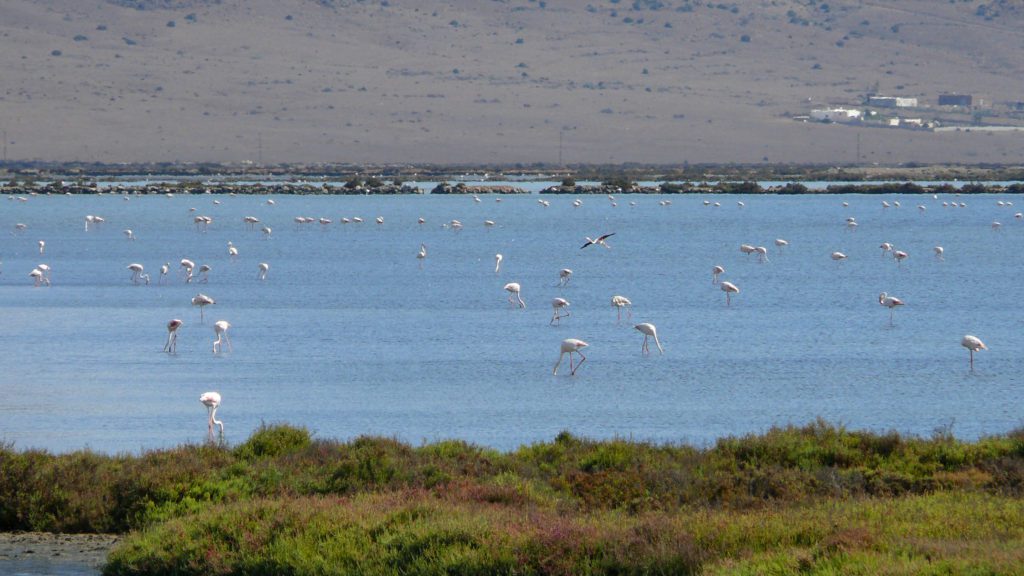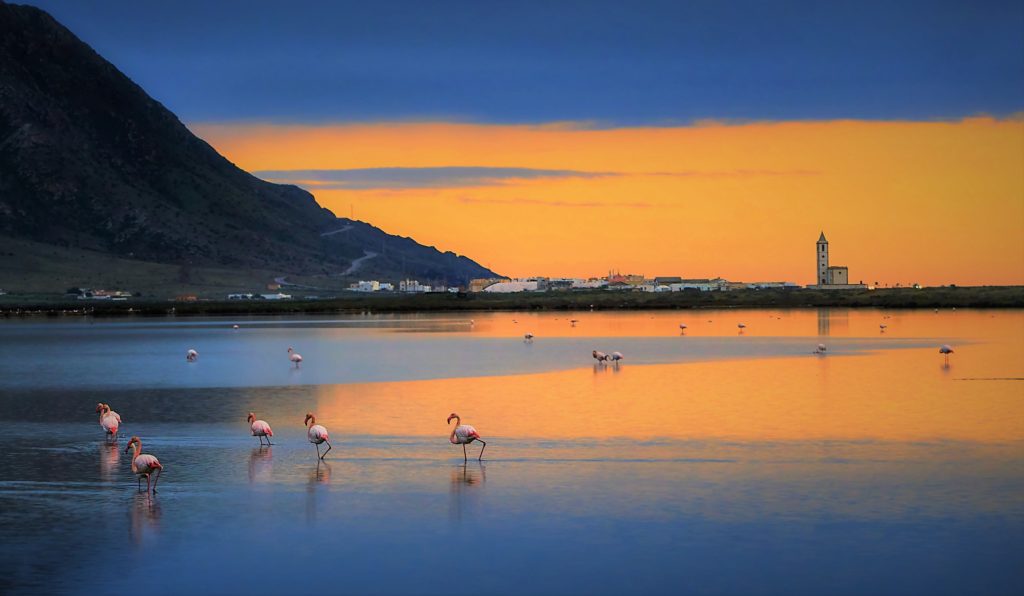Extreme ocean temperatures causing marine destruction and massive social and economic impacts.

Flamingos splashing pink on the landscape of Cabo de Gata salt flats in Almería, Spain, are one of the iconic images of the region. I used to go to watch them every year, in a unique area between the sea and the desert, at my mother’s home in south-east Spain, one of the most avifauna-rich wetlands in the European Mediterranean. Last summer they were gone, the salt flats were dried out, with the seawater supply to the ponds had been interrupted because of the torrential rains that hit the region in spring. Without food and water, flamingos and other birds had to migrate to other wetlands.
Unfortunately, the birds have not been the only ones affected by the extreme climate events this summer. Neighbors and friends I meet each year could not talk about anything else, the suffocating heat day after day, which gave no respite even in the early morning; the impossibility of sleeping; plants dying of thirst; sea water that feels like a warm soup.
The Spanish State Meteorological Agency (AEMET) points to summer 2022 as the warmest since records have been kept, with an average temperature 2.2°C above average for this period and with 42 days being classified as in a heatwave.
This summer has been the hottest on record across all of Europe. It led to a major marine heatwave in the Mediterranean Sea, with temperatures 5°C higher than average, and some parts even exceeding the 30ºC barrier.
This ocean warming is happening at an unprecedented rate, affected by the global temperature rise, with a direct effect on the increase of marine heatwaves (MHWs) occurring. This is the phenomenon taking place when ocean temperatures are extremely warm for an abnormally extended period of time.
Devastating Consequences All Round
More than 17.000 marine species (4 to 18% of the world’s known marine species) inhabit the Mediterranean. Between 20 and 30% of these are endemic, the highest rate of endemism globally.
A Global Change Biology study on heatwaves in the Mediterranean Sea conducted between 2015 and 2019 highlights the mass mortality events of marine organisms as one of the main consequences. They found that heatwaves led to the death of a large number of marine species from corals to shellfish and sponges, and affected to thousands of kilometers of coastline, both at the surface and into the deep.
“The observed patterns point toward a future of winners and losers in the Mediterranean Sea in the face of climate change, which could likely lead to local, regional, or even pan-Mediterranean ecological extinctions of species, widespread structural and compositional changes of ecological communities, and potential subsequent changes in ecosystem functioning, particularly where lost species are functionally unique,” the authors conclude.
Following a summer of extremely high water temperatures, comes a fall of extreme weather events. We have already seen hailstorms in Catalonia, thunderstorms in Corsica and severe drought throughout the region. There is even the risk of hurricanes from Tropical latitudes, such as the cyclone that affected Greece in September 2021.
This year we are already witnessing heavy precipitation leading to flooding in several parts of Europe. These phenomena concern not only marine biodiversity, but all ecosystems, including flamingos, herons, gulls and thousands of other species that fled the Cabo de Gata salt flats before the summer.
On top of the biodiversity catastrophe, marine heatwaves produce human society impacts and economic consequences on fisheries, aquaculture and industries such as tourism. They increase ocean stressors such as stratification, acidification, and deoxygenation.

Urgent Integrated Policies
The UNEP Regional Seas Programme has been implementing regional policies for marine and coastal protection in 146 countries since 1974. They fight marine pollution, create Marine Protected Areas across the world to protect biodiversity, and foster climate change research and monitoring. Nevertheless, they acknowledge the lack of a political and formal integrated response for a healthy ocean.
We need to put in place stronger emission reduction targets. There is a lack of investment in research, data monitoring and impact evaluation to assess the harm already caused and define ways to revert it. But mainly, we urgently need to build responsible and resilient policies that protect oceans. Climate education will be key.
Biodiversity and ecosystem restoration in the Mediterranean is no longer optional, but necessary. But it’s time to provide an integrated response to the climate-related changes in our seas and oceans that tackles the root cause of these and not only tries to mitigate its effects. Protecting marine ecosystems, and especially conserving the treasure of biodiversity in the Mediterranean and other seas, should be at the top of the global climate agenda.
